
Section Branding
Header Content
Georgia Today: Former President Jimmy Carter dies in Plains at age 100
Primary Content
LISTEN: On the Monday, Dec. 30 edition of Georgia Today, we remember former President Jimmy Carter, who died yesterday in Plains, Ga., at the age of 100.

Peter Biello: Welcome to the Georgia Today podcast from GPB News. Today is Monday, Dec. 30. I'm Peter Biello. On today's episode, we remember former President Jimmy Carter, who died yesterday in Plains, Ga., at the age of 100. We'll hear tributes from Georgians and Georgia politicians today. And we want to hear your tributes to record yours using the GPB app. We'd love to include you as we continue our coverage of his life and legacy. A remembrance of Jimmy Carter. That's on this edition of Georgia Today.
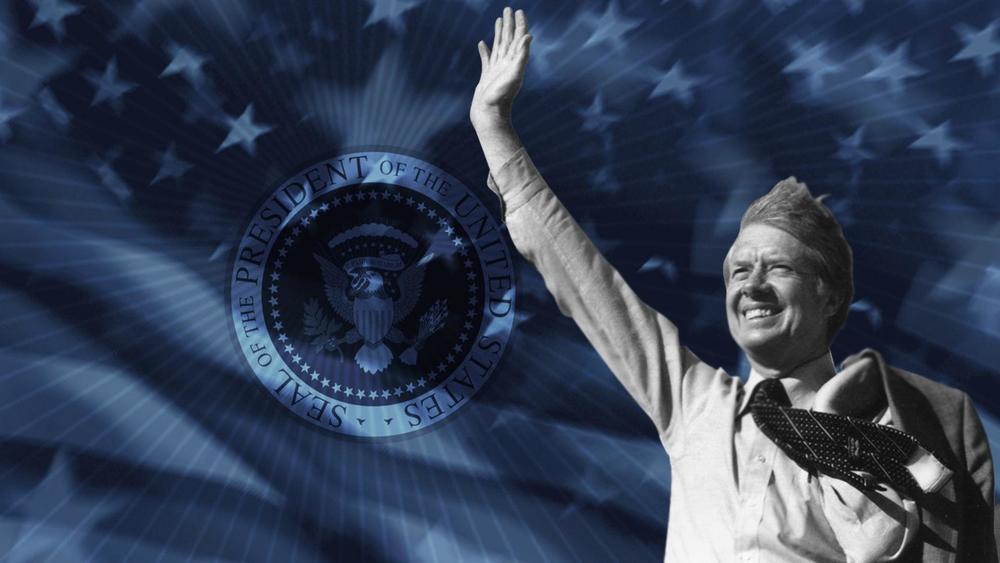
Story 1:
Peter Biello: Former President Jimmy Carter, a Georgia native and the 39th president of the United States, passed away at his home in Plains yesterday at the age of 100. After a life of service, he spent his final months in hospice care. GPB's Chase McGee has this remembrance.
Chase McGee: James Earl Carter Jr. was the country's 39th president, the 76th governor of Georgia and a Nobel Prize-winning humanitarian. Born in Plains in 1924, he served in the Navy full time from 1946 to 1953 before returning to the family peanut farm and eventually serving in the Georgia state Senate. At age 100, he was the longest-lived president in American history. And after marrying his wife, Rosalynn in 1946, the Carters also had the longest presidential marriage in U.S. history. Rosalynn Carter died in November of 2023. The pair grew up just a few miles apart and were inseparable. Rosalynn was his closest adviser, biggest campaigner and a fierce advocate for mental health as the first lady of Georgia and the country. While growing the family business, Carter grew his political involvement through service on numerous boards in Sumter County before winning a state Senate seat, losing a Democratic primary for governor in 1966 and then winning four years later.
State Senator: I, Jimmy Carter, do solemnly swear.
Jimmy Carter: I, Jimmy Carter, do solemnly swear.
Chase McGee: A 1971 New York Times article about Carter's inauguration as Georgia's governor highlighted his call for an end to racial discrimination, quote, "stripping the Deep South of staunch conservatives."
Judge: I, Jimmy Carter, do solemnly swear.
Jimmy Carter: I, Jimmy Carter, do solemnly swear.
Chase McGee: As president, Carter had several successes, including the establishment of the Department of Education, passing ethics legislation and overseeing the Camp David Accords, which established a framework for a Middle East peace treaty. But his term was marked by challenges that hurt him politically, including the Iran hostage crisis and resulting gasoline shortages across the country. On July 15, 1979, he delivered his famous malaise speech about a crisis facing America.
Jimmy Carter: It is a crisis of confidence. It is a crisis that strikes at the very heart and soul and spirit of our national world.
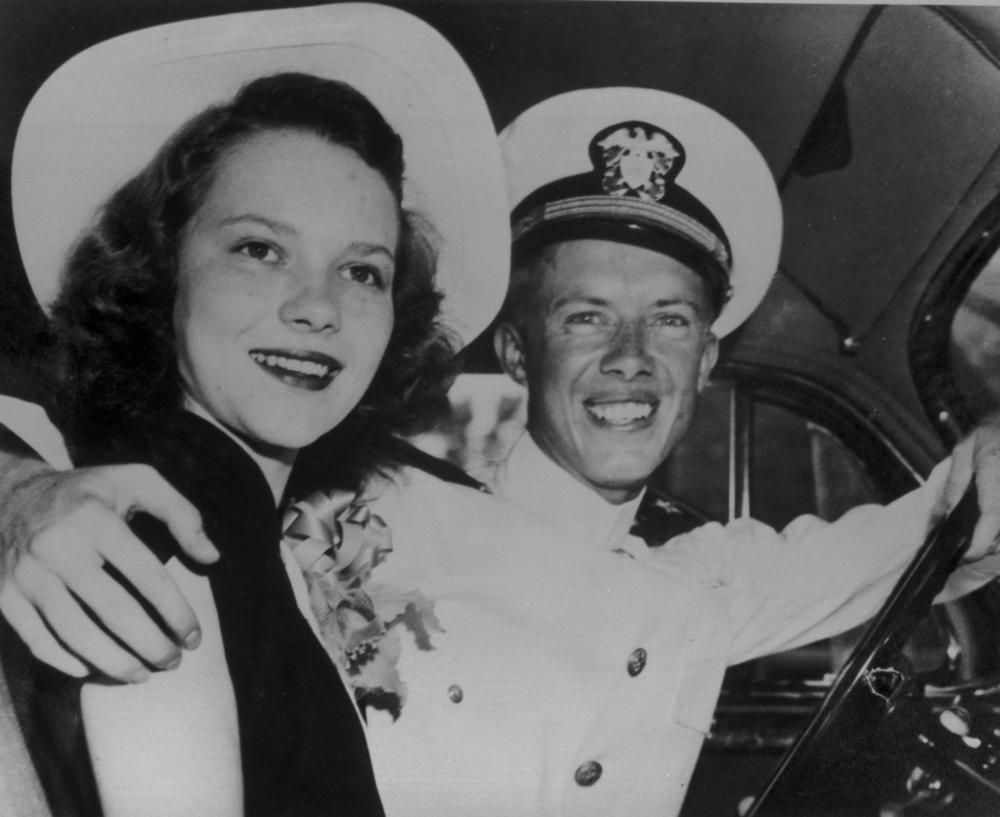
Chase McGee: He suffered a crushing defeat in the 1980 presidential election against Ronald Reagan. But his faith, his hometown and his lifelong partner, Rosalynn, prepared him for his next chapter: waging peace. Founded in 1982, the Carter Center was a natural extension of his presidential focus on diplomacy. Since 1982, the center has monitored elections around the world, virtually eradicated Guinea worm, and furthered the conversation around mental health care. In 2002, Jimmy Carter won the Nobel Peace Prize for his, quote, "decades of untiring effort to find peaceful solutions to international conflicts, to advance democracy and human rights, and to promote economic and social development." On many Sundays, you could find the lifelong Baptist teaching Sunday School at Maranatha Baptist Church in Plains. Here's Carter in 2015 after a cancer diagnosis.
Jimmy Carter: The haven for our lives have been — has been in Plains, Ga. I plan to teach Sunday School this Sunday and and every Sunday, as long as I'm, you know, physically and mentally able in my little church. And we have hundreds of visitors who come, to see the curiosity of a politician teaching the Bible.
Chase McGee: Carter's post-presidential passions included bike riding, birdwatching and building homes with Habitat for Humanity. In recent years, health concerns and the pandemic saw Carter retreat from public life. He entered hospice care in February of 2023. He is survived by his four children and their families. For GPB News, I'm Chase McGee.
Story 2:
Peter Biello: As the nation says goodbye to former President Jimmy Carter, state officials in Georgia are preparing for an influx of mourners. GPB's Sarah Kallis reports.
Sarah Kallis: Gov. Brian Kemp declared a state of emergency for Sumter County, Carter's hometown county, through Jan. 12. He said in an executive order that the state expects the number of visitors flocking to Plains will exceed the management capacity of local government. Declaring a state of emergency allows more state resources to be directed towards the small South Georgia city. Those resources can include additional public safety officers and transportation. The Georgia Emergency Management and Homeland Security Agency will also activate the state operations center to coordinate with different state agencies. Camp also ordered the U.S. and state of Georgia flags to be flown at half staff until sunset on Jan. 28. For GPB News, I'm Sarah Kallis.
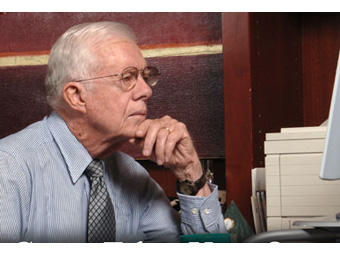
Story 3:
Peter Biello: Tributes to former President Carter are pouring in from all over the world. And here in Georgia. Beatrice Penton stopped by the Carter Center in Atlanta after the news of his death was made public.
Beatrice Penton: You know, I'm 35, so as long as I've been around, he's been a figure, whether I really knew who he was or just knew of him, right? Growing up as a child. So that's someone that you never want to you don't imagine kind of never being there, even if it is sort of expected at the end of the day.
Peter Biello: Michael Ritter lives near the Carter Center. He joined a steadily growing stream of people there.
Michael Ritter: I'm just paying respects. I think it's the right thing to do. He was a good man. I think, like that's there's a lot of divide in the world right now when it comes to, you know, different sides of politics. But like, there was no denying that that was a good man.
Peter Biello: Meanwhile, high-profile politicians are paying tribute to the late former president. Sen. Jon Ossoff said Carter's dedication to public service, quote, "changed many lives." Sen. Raphael Warnock said Carter was a, quote, "shining example of what it means to make your faith come alive through the noble work of public service." Gov. Brian Kemp noted the 77-year marriage that Carter enjoyed with first lady Rosalynn Carter, calling it, quote, "perhaps his greatest distinction." Lt. Gov. Bert Jones said Carter, quote, "exemplified what it means to be a public servant." For more on Georgia tributes to the 39th president, as well as details on the timing of services and memorials in Atlanta, Plains and Washington, D.C., visit GPB.org/JimmyCarter.
Story 4:
Peter Biello: For 40 years, the Carter Center has championed peace, human rights and global health. GBP's Pamela Kirkland sat down with Paige Alexander, CEO of the Carter Center, to discuss Carter's enduring legacy.
Pamela Kirkland: I want to start with the original mission of the Carter Center. Some 40 years ago, Jimmy Carter wanted to continue having an impact globally, and this center was born out of that. What was the vision for the center some 40 years ago, and what has the Carter Center achieved since then?
Paige Alexander In 1982, as President and Mrs. Carter like to say, when they were involuntarily retired from the White House, they had an opportunity to continue to do the work that they had wanted to do and finish up in the White House. And so, by establishing the Carter Center here in Atlanta, he wanted to create kind of a mini-Camp David. And the idea was to be able to focus on the things that mattered to him: human rights, conflict resolution, alleviating suffering. And so that's how the Carter Center was built. So we're here on over 30 acres in Freedom Park, and we have for 40 years hosted world leaders and tried to solve problems and — and create space for people to have conversations.
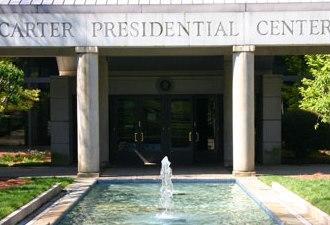
Pamela Kirkland: President Carter's commitment to human rights and diplomacy are a cornerstone of his legacy. How has the center continued to champion that work?
Paige Alexander: President Carter always spoke the truth and he wanted to be of service to people. And so when the Carter Center was created, and we spent time traveling overseas and filling our roles with experts and people who care deeply about those small villages at the end of the road in Mali, in Sudan, in Ethiopia, it gave him an opportunity. It gave them an opportunity and us to figure out what we could do at the end of the road. And we always see these people as the same as President and Mrs. Carter: The possibilities and the potential is there; the attention is not. And so by highlighting these places, it gives us an opportunity to help people help themselves.
Pamela Kirkland: I feel like so many people think of the global impact that the Carter Center has, and there are a lot of things domestically that are being done here. At the same time, you have a city like Atlanta that is really becoming much more global in the sense of the people who are coming here. And so how does all of that come together? Atlanta is such a hub of, you know, innovation and new ideas. The Carter Center is just so well-placed in a place like that.
Paige Alexander: Well, we're fortunate enough to have a good partnership with Emory University — a number of universities throughout Atlanta and Georgia. And we also have the CDC here in Atlanta. And so looking at global health issues at a time when the world now understands what global health and what a global pandemic means, being able to look at that from the center, from being in Atlanta is really important. And again, the Carter Center has always worked internationally on these issues, but to now be able to look at mental health crisis, mental illness, all of these issues now are relevant. And so Atlanta kind of is a center of the universe in many of them. And so it's really a pleasure to have our center here.
Pamela Kirkland: The Camp David Accords, widely regarded as one of President Carter's greatest diplomatic achievements. How does the enduring legacy of the Camp David Accords continue to influence some of the international relations policies that we see today?
Paige Alexander: Yeah, the Camp David Accords were absolutely one of his major accomplishments. And I think he has been a champion for peace. And we have continued to look at those opportunities, whether it's what is happening in Sudan, whether it's what's happening in Ethiopia, or throughout Asia. This is the work that we do because we have 3,100 staff people and they're all overseas, and we've got 300 here in Atlanta. But the bulk of the work that we do is overseas, and all politics is local and all development is local. So for our opportunity to take the cues from the staff in the field to figure out what the next step is and where conflicts need to be resolved and where there are human rights abuses and what are the diseases that are prevalent that are holding communities back? All of that is what we look at in the field, and then we try to help address it.
Pamela Kirkland: I wanted to touch on both the mental health and access to health care, that you all address as well. How do those efforts reflect the organization's commitment to addressing some of these societal issues, and how did they contribute to the legacies of both Jimmy and Rosalynn Carter?
Paige Alexander: Well, Mrs. Carter spent 50 years trying to make sure that mental illness was de-stigmatized. And if COVID did one thing for all of us, it was to bring that closer to home. The fact that it would be hard to be in a room with someone and say, "Does anyone know anyone who's had a mental health crisis in the past four years?" Everyone would raise their hand. And so now people understand it's a health issue and it's a human right, and it is something that needs to be addressed. You know, mental health at this point is when someone has a mental health crisis and the first call is to the police because they're on the corner of the street doing something they shouldn't. That's not who the first call should be to. So as we work in Atlanta on expanding our — our work on policing alternatives and looking at trying to have people with lived experience address the mental health issues to keep people out of jail. That's one element. The work that Mrs. Carter did on the mental health side and the work that President Carter did on resolving conflicts. You know, we're — history's repeating itself right now, and we are constantly finding ourselves in a situation where President Carter had so many contacts throughout Israel and Palestine, for example, or throughout Sudan and South Sudan, that we are still able to talk to. And they trust us as an honest broker. And it's because we are now chock-full of experts who learned at the feet of President and Mrs. Carter as to how to bring these issues to the forefront in a quiet diplomacy type of way through shuttle diplomacy without press and keeping our name out of it, but still bringing people to the table. So that's the legacy that the Carter Center is living with.
Pamela Kirkland: Thinking back to again post-presidency Jimmy Carter thinking he wanted to tackle things like global health and potential pandemics, the eradication of Guinea worm, mental health when it comes to the first lady and some of her initiatives and where we are today. You mentioned COVID and how that brought up so many of these issues. How unique is that, that they had that much foresight to see that these were issues that needed to be addressed?
Paige Alexander: They're both incredibly unique individuals. I think history has shown their contribution to the world and to the political process, and to everything that they did when they were in the White House and the governor's mansion here in Georgia. It's indicative of the legacy that they've left behind in the organization that bears their name here at the Carter Center. So for us building out on that legacy and making sure that we adjust to changing times. As President Carter used to say, there are always — there's always going to be work to do in this field, and we'll continue to do it.
Pamela Kirkland: Paige Alexander, thank you so much.
Paige Alexander: Thank you. It's a pleasure talking about the Carter Center and President and Mrs. Carter's legacy.
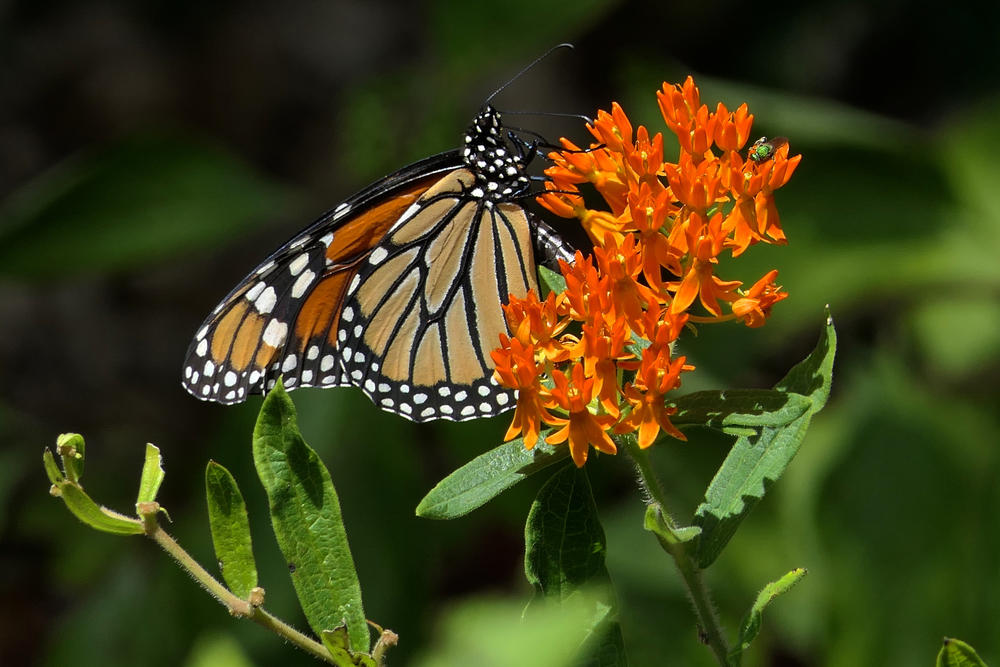
Story 5:
Peter Biello: We do have a bit of news unrelated to the passing of former President Carter. A group of universities and government agencies that study monarch butterflies in southeastern states is asking the public to report when they see the orange and black pollinators this winter. GPB's Devon Zwald reports on the effort in Georgia.
Devon Zwald: Thousands of monarch butterflies travel across the South each fall on their way to Mexico for the winter. But not all make the full migration, says Anna Yelland with the Georgia Department of Natural Resources. She says public reporting can help scientists know where those monarchs are and why.
Anna Yelland: We have no way of knowing where they are unless we get that information from the public. If the monarchs are stopping along the way and overwintering somewhere in this country, we want to know about that. So we'd be able to maybe — to hopefully protect that area.
Devon Zwald: Yelland asked the public to report sightings through March 1 on The Journey North and iNaturalist websites or app. The U.S. Fish and Wildlife Service earlier this month announced a proposal to list the monarch butterfly as threatened under the Endangered Species Act. For GPB News, I'm Devon Zwald.
Story 6:
Peter Biello: Atlanta's Metropolitan Rapid Transit Authority, or MARTA, is increasing train service for some New Year's-related events. MARTA says trains will run every seven minutes on New Year's Eve for the Peach Drop and New Year's Day for the Peach Bowl on the red gold lines and blue green lines between certain stations. MARTA also will run trains every seven minutes on those same lines for the polar opposite race on Jan. 4. Runners will race from Piedmont Park to Lenox Square. It's the Peachtree Road race in reverse.
And that is it for this edition of Georgia Today. If you want to learn more about these stories, visit GPB.org/news. And remember to subscribe to this podcast. We've got a lot of Jimmy Carter tributes coming your way this week. We won't want you to miss a thing, so subscribe and we'll pop up automatically in your podcast feed. And your feedback is always welcome. You can email us at GeorgiaToday@GPB.org. I'm Peter Biello. Thanks again for listening. We'll see you tomorrow.
---
For more on these stories and more, go to GPB.org/news



